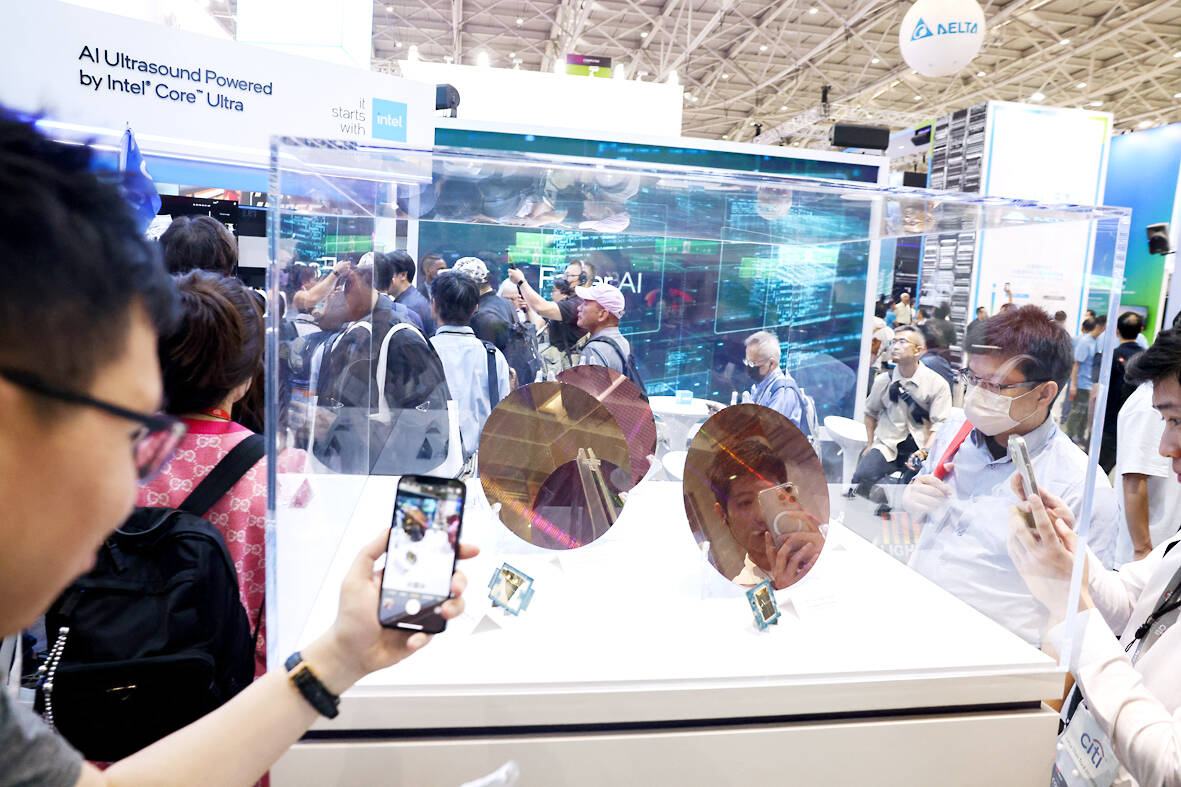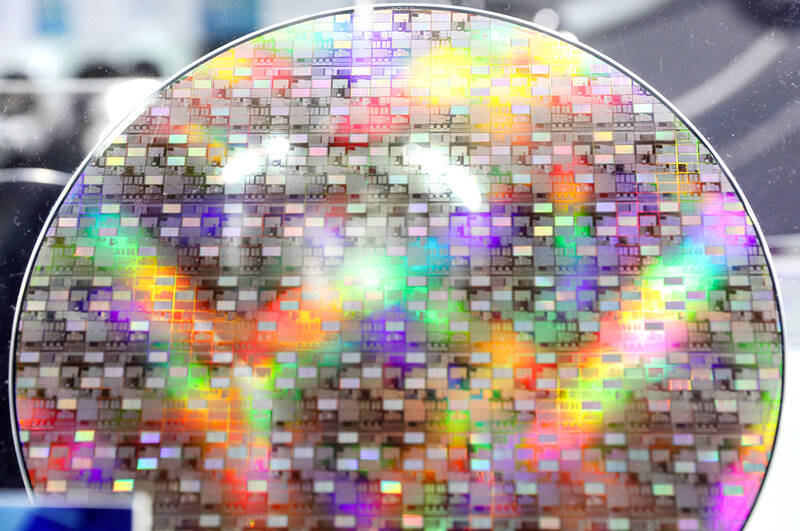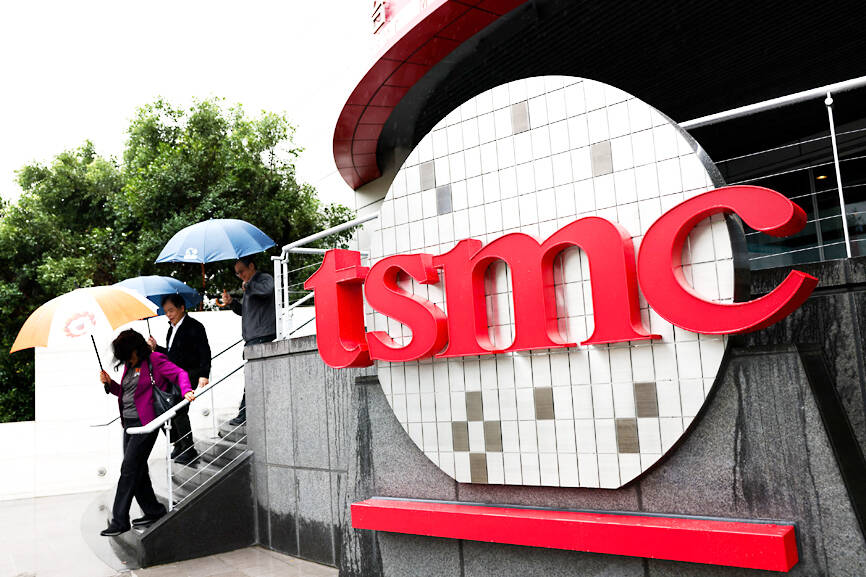US President Donald Trump’s threat of tariffs on semiconductor chips has complicated Taiwan’s bid to remain a global powerhouse in the critical sector and stay onside with key backer Washington, analysts said.
Since taking office last month, Trump has warned of sweeping tariffs against some of his country’s biggest trade partners to push companies to shift manufacturing to the US and reduce its huge trade deficit.
The latest levies announced last week include a 25 percent, or higher, tax on imported chips, which are used in everything from smartphones to missiles.

Photo: AFP
Taiwan produces more than half of the world’s chips and nearly all of the most advanced ones, making the country essential to global supply chains.
The island’s economic importance has been described as a “Silicon Shield” against an invasion or blockade by China, which claims it as part of its territory and has threatened to use force to bring it under its control.
“Taiwan’s economic security depends heavily on its leadership in semiconductor manufacturing, which it has been using strategically to maintain its importance in global supply chains,” said Julien Chaisse, an international trade expert at City University of Hong Kong.

Photo: AFP
“I think that Trump’s tariff threats make this strategy much more complicated. For instance, Taiwan could face pressure to make concessions.”
Despite strong bipartisan support in the US Congress for Taiwan, there are fears Trump might not consider the country worth defending if China attacked.
Trump has accused Taiwan of stealing the US chip industry and suggested it should pay the US for its protection.

Photo: AFP
Taiwan President William Lai (賴清德) has already vowed to boost investment in the US to reduce the trade imbalance and spend more on the island’s military, while his government is also considering increasing US natural gas imports.
GIVE IT ALL AWAY
The pressure from Trump may accelerate the shift of Taiwanese chip production to the US, said Wayne Lin of Witology Markettrend Research Institute in Taipei, but he added it would take years to build new foundries.
Taiwan’s TSMC, which is the world’s largest chipmaker, has long faced demands to move more of its production away from Taiwan.
The company has pledged to invest more than US$65 billion in three factories in Arizona, one of which began production late last year. TSMC plans a second facility in Japan and last year it broke ground on its first European plant. But there are concerns Taiwan could lose its “silicon” protection if its companies build too many factories overseas.
“It’s a very dicey situation that they’re in,” said Dan Hutcheson, a California-based senior research fellow at specialist platform TechInsights. “It’s in (Taiwan’s) interest to move some of their manufacturing (to the US), but not to give it all away, because if they give it all away, then they lose their importance.”
RECESSION THREAT
Taiwan’s government is still calculating the potential impact of Trump’s tariffs and has flagged support for affected industries.
One determining factor would be whether levies are applied only to chips shipped to the US or also on chips in finished products.
A fraction of Taiwan’s US$165 billion in chip exports last year went directly to the US, official data show.
The vast majority were sent to other countries where they were put into electronic products for export.
“A 25 percent tariff is significant, but it is unlikely to be a game changer for Taiwan’s semiconductor industry, certainly in the short term,” said Robyn Klingler-Vidra, an innovation policy expert at King’s College London.
But, she warned, the tariffs “will likely have broader global supply chain effects rather than simply curbing direct Taiwan-to-US exports.”
Tariffs could raise the price of smartphones and laptops, hurting demand for chips and potentially triggering a “recession in the semiconductor industry,” Hutcheson said.
Taiwan National Security Council chief Joseph Wu said last Thursday that US consumers would end up bearing the cost of the levies.
“I’m sure, eventually, the US will reconsider its decision,” Wu said.

As Taiwan’s second most populous city, Taichung looms large in the electoral map. Taiwanese political commentators describe it — along with neighboring Changhua County — as Taiwan’s “swing states” (搖擺州), which is a curious direct borrowing from American election terminology. In the early post-Martial Law era, Taichung was referred to as a “desert of democracy” because while the Democratic Progressive Party (DPP) was winning elections in the north and south, Taichung remained staunchly loyal to the Chinese Nationalist Party (KMT). That changed over time, but in both Changhua and Taichung, the DPP still suffers from a “one-term curse,” with the

William Liu (劉家君) moved to Kaohsiung from Nantou to live with his boyfriend Reg Hong (洪嘉佑). “In Nantou, people do not support gay rights at all and never even talk about it. Living here made me optimistic and made me realize how much I can express myself,” Liu tells the Taipei Times. Hong and his friend Cony Hsieh (謝昀希) are both active in several LGBT groups and organizations in Kaohsiung. They were among the people behind the city’s 16th Pride event in November last year, which gathered over 35,000 people. Along with others, they clearly see Kaohsiung as the nexus of LGBT rights.

Jan. 26 to Feb. 1 Nearly 90 years after it was last recorded, the Basay language was taught in a classroom for the first time in September last year. Over the following three months, students learned its sounds along with the customs and folktales of the Ketagalan people, who once spoke it across northern Taiwan. Although each Ketagalan settlement had its own language, Basay functioned as a common trade language. By the late 19th century, it had largely fallen out of daily use as speakers shifted to Hoklo (commonly known as Taiwanese), surviving only in fragments remembered by the elderly. In

Dissident artist Ai Weiwei’s (艾未未) famous return to the People’s Republic of China (PRC) has been overshadowed by the astonishing news of the latest arrests of senior military figures for “corruption,” but it is an interesting piece of news in its own right, though more for what Ai does not understand than for what he does. Ai simply lacks the reflective understanding that the loneliness and isolation he imagines are “European” are simply the joys of life as an expat. That goes both ways: “I love Taiwan!” say many still wet-behind-the-ears expats here, not realizing what they love is being an